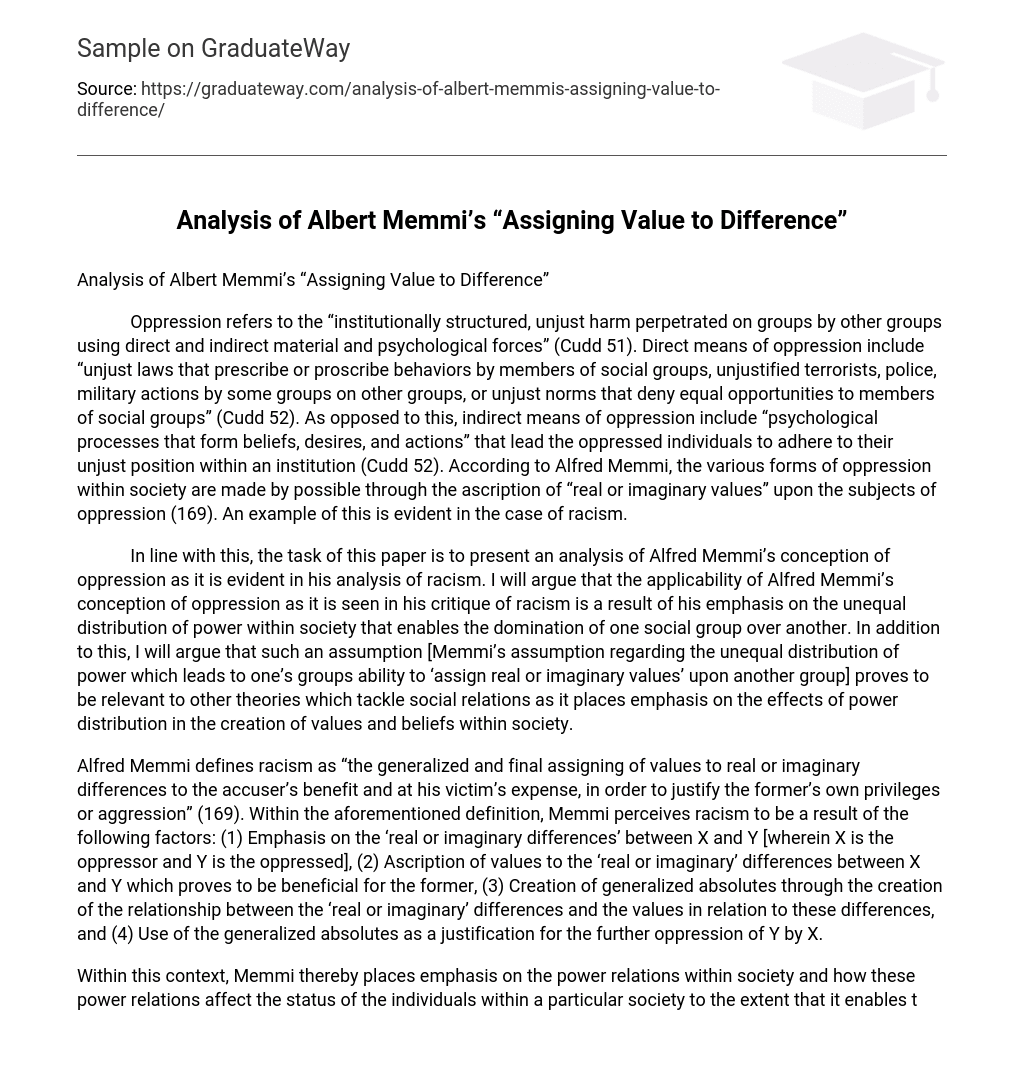Oppression refers to the “institutionally structured, unjust harm perpetrated on groups by other groups using direct and indirect material and psychological forces” (Cudd 51). Direct means of oppression include “unjust laws that prescribe or proscribe behaviors by members of social groups, unjustified terrorists, police, military actions by some groups on other groups, or unjust norms that deny equal opportunities to members of social groups” (Cudd 52). As opposed to this, indirect means of oppression include “psychological processes that form beliefs, desires, and actions” that lead the oppressed individuals to adhere to their unjust position within an institution (Cudd 52). According to Alfred Memmi, the various forms of oppression within society are made by possible through the ascription of “real or imaginary values” upon the subjects of oppression (169). An example of this is evident in the case of racism.
In line with this, the task of this paper is to present an analysis of Alfred Memmi’s conception of oppression as it is evident in his analysis of racism. I will argue that the applicability of Alfred Memmi’s conception of oppression as it is seen in his critique of racism is a result of his emphasis on the unequal distribution of power within society that enables the domination of one social group over another. In addition to this, I will argue that such an assumption [Memmi’s assumption regarding the unequal distribution of power which leads to one’s groups ability to ‘assign real or imaginary values’ upon another group] proves to be relevant to other theories which tackle social relations as it places emphasis on the effects of power distribution in the creation of values and beliefs within society.
Alfred Memmi defines racism as “the generalized and final assigning of values to real or imaginary differences to the accuser’s benefit and at his victim’s expense, in order to justify the former’s own privileges or aggression” (169). Within the aforementioned definition, Memmi perceives racism to be a result of the following factors: (1) Emphasis on the ‘real or imaginary differences’ between X and Y [wherein X is the oppressor and Y is the oppressed], (2) Ascription of values to the ‘real or imaginary’ differences between X and Y which proves to be beneficial for the former, (3) Creation of generalized absolutes through the creation of the relationship between the ‘real or imaginary’ differences and the values in relation to these differences, and (4) Use of the generalized absolutes as a justification for the further oppression of Y by X.
Within this context, Memmi thereby places emphasis on the power relations within society and how these power relations affect the status of the individuals within a particular society to the extent that it enables the creation and maintenance of a hegemonic group that determines both the substantive and normative facts within a particular society. Memmi’s claim above, for example, may also be seen in cases of colonialism and imperialism. Colonialism refers to the “antagonistic interaction between ‘alien’ societies that differ by geographical, linguistic, cultural and ethnic differences” (Peterson 23). Imperialism, on the other hand, refers to the creation of an empire that is politically controlled by a single society. Colonialism, within this context, stands as a result of imperialism since the creation of an empire necessitates the colonization of other societies. Such a process leads to the oppression of the colonized group. This is evident in the shift of the power relations within a colonized society wherein the colonizer becomes the new hegemonic group within that society. The necessity for the colonizer to gain hegemonic power within a colonized society is evident if one considers that the creation of an empire does not merely involve controlling political power within a number of previously independent societies but it also necessitates the creation of a culture that allows the interrelation of the various colonized societies within an empire. The creation of such a culture, on the other hand, requires the creation of a new set of substantive and normative beliefs that will be imposed by the colonizer upon the members of the colonized societies.
Such an imposition also leads to oppression since its effectiveness requires the colonizer to de-emphasize if not destroy the social and cultural beliefs which defined the identity of the members of the colonized societies before their colonization [e.g. the colonizer destroys or reconstructs a colonized society’s history]. Oppression, in this sense, occurs in instances of colonialism and imperialism as a result of the imposition of one group’s social reality upon another group.
In summary, the effectiveness of Memmi’s discussion and critique of racism, in relation to other forms of oppression [such as colonialism and imperialism] may be traced to its emphasis on how power relations determine the creation of normative and substantive beliefs in society that leads and enables a hegemonic group to take advantage over another group within society. Memmi’s conception of oppression as a form of value imposition shows that in the same way that oppression stands as a result of the creation of values, the end of oppression may also be enabled by the correction of these mistaken definitions of values. It is important to note however that although Memmi’s discussion of racism and oppression proves to be enlightening, it also fails to account for the fact that values are themselves creation of human beings and as such their viability is only dependent upon the existence of social consensus. If such is the case, it follows that to perceive oppression as a result of value imposition necessitates the perception of oppression as a result of social consensus. Although, Memmi recognizes the manner in which societal consensus affects conditions and practices of oppression, it is also necessary for him to further consider how social consensus enables conditions and practices of oppression.
Works Cited
Cudd, Ann. Analyzing Oppression. Oxford: Oxford U.P., 2006.
Memmi, Albert. Racism. Trans. Steve Martinot. Minnessota: U of Minnesota P, 1999.





